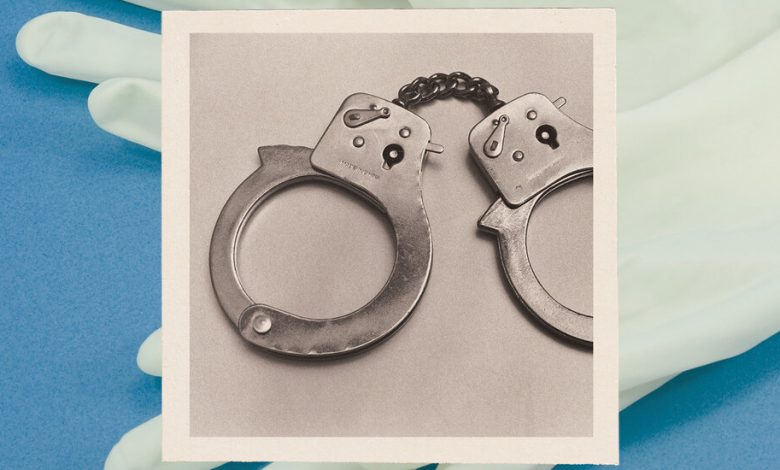The Big #MeToo Moment for Doctors Is Finally Here

In January of 2016, Aja Newman went to the emergency room at Mount Sinai Hospital in New York City for discomfort in her right shoulder. What should’ve been a routine visit instead unfolded as a harrowing, grotesque distortion of the doctor-patient interaction.
The E.R. doctor, David Newman (who was not a relative of Ms. Newman), drugged her with intravenous morphine, a strong narcotic, and propofol, a powerful sedative — both of which would have been unlikely to be used for her symptoms. He then groped her breasts and masturbated over her face, prosecutors said.
I remember how the horror of this news, which came out a week later, disoriented the E.R. community. What sort of moral decay leads a doctor toward such a profound betrayal of a patient’s trust? I had never met Dr. Newman, but I had heard of him because he was a fellow E.R. doctor and a prolific researcher on clinical decision-making. He also had written several essays for The Times, as well as a popular book that promised to strengthen the doctor-patient relationship. A Wired profile described his “steady blue eyes” and lauded his use of “science to protect patients” and his potential to “transform American medicine.” One prominent E.R. doctor in California expressed his shock publicly: “Everyone is saying: ‘David? This doesn’t make any sense.’”
Though the #MeToo movement rapidly made its way through many industries starting in 2017 — the year that Dr. Newman was sentenced to two years in prison — it seemed to inch sluggishly and unevenly through the medical field, particularly regarding doctors’ sexual misconduct toward patients. Dr. Newman’s acts clearly demonstrated that doctors, no matter how eminent and well respected, could be just as culpable of using their power to commit sexual misdeeds as famous Hollywood producers. Yet there was no seismic reckoning like those that had rocked other industries. Aside from the widely known case of Larry Nassar, many doctors who had preyed on their patients for years behind closed doors remained obscured, some of them likely shielded by their own institutions.
Now the edifice may finally be cracking: The #MeToo movement is picking up pace in the medical profession. Though it’s been slow going and long delayed, survivors may see justice dealt, and future offenses could be prevented. This spring, Darius Paduch, a urologist who was affiliated with multiple prominent academic medical centers in New York, was charged with sexually abusing patients, including minors, for years. Zhi Alan Cheng, a gastroenterologist, is charged with sexually assaulting unconscious patients and filming them at NewYork-Presbyterian Queens Hospital, as well as with assaulting other women at his home. Both doctors could spend the rest of their lives in prison if convicted. Derrick Todd, a rheumatologist who worked at the Harvard-affiliated Brigham and Women’s Hospital, has been accused by more than 100 women of performing unnecessary or inappropriate breast, pelvic and rectal exams. (Drs. Paduch and Cheng have pleaded not guilty. Dr. Todd, who is the subject of an ongoing investigation, has denied any wrongdoing).
But why did it take so long for the #MeToo movement to knock on medicine’s door — and for institutions to reckon with it?
In truth, I shouldn’t have been so surprised by Dr. Newman’s actions because the case of Robert Hadden, a doctor who has been accused of sexually assaulting hundreds of his patients for two decades, had been unraveling at my own institution, Columbia University’s medical center, since 2012. Dr. Hadden was an obstetrician-gynecologist who was first arrested when a patient called the police and reported that he had licked her genitals during an exam. Despite the fact that he was under criminal investigation following his arrest (which was not accompanied by formal charges), and that Columbia had been warned about the doctor for almost two decades, he was allowed to continue seeing patients for several weeks afterward. In early 2016, a month after Dr. Newman’s assault of Aja Newman was made public, Dr. Hadden quietly entered a plea deal with no prison time; it wasn’t until this past July that he was convicted by federal authorities for sexually assaulting four patients during exams after inducing them to cross state lines, and sentenced to 20 years in prison. Though I was working at the medical center while the accusations unfurled, I wasn’t aware of them until more recently. In fact, the first time I received any direct communication about Dr. Hadden’s actions from my employer was an email which linked to a statement in September 2023, after detailed stories emerged in the media.
What unites the cases of Dr. Newman, Dr. Hadden and others — and may be why medicine dodged #MeToo for so long — is that their institutions made it challenging to substantiate patients’ claims, even when there were many of them, over the course of years. Hospitals may use the Health Insurance Portability and Accountability Act, which seeks to ensure patient privacy and confidentiality, and marshal it against survivors, investigators and journalists. Though Dr. Newman had been accused of previously assaulting three other women, Mount Sinai refused to turn over these records during legal proceedings, citing HIPAA regulations. The New York State Supreme Court overruled the medical center, stating that HIPAA did not apply.
These institutions wield vast resources to protect their reputations, as well as the abusers they employ, which enables their crimes to go on for longer. When some patients tried to file complaints against Dr. Hadden, they were sent to Columbia’s formidable legal team instead — a referral that in at least one instance discouraged further reporting efforts. Even after Dr. Hadden was found guilty, Columbia did not notify all of his patients about his behavior. On Nov. 23, the one-year look-back window closes for past patients to sue Dr. Hadden and the medical center. That window only exists because of the Adult Survivors Act, for which his accusers and others had fought so hard to pass in New York.
As more cases emerge, institutions seem to be shifting their focus from protecting abusers to quickly severing ties with them. Still, institutional reactions tend to characterize perpetrators as rogue outliers who bear no reflection on their employers, even though Dr. Paduch, Dr. Cheng and Dr. Hadden had all worked, at some point, within the same health system. Now that these cases are becoming public, hospitals are responding with mandatory online trainings for doctors, such as ones instructing them to use chaperones during sensitive exams. But will these learning modules adequately protect patients or simply serve as institutional check boxes?
State medical boards, of which doctors make up the majority, may not respond better. An Atlanta Journal-Constitution national investigation in 2016 found that half of doctors who were publicly disciplined for sexual abuse of patients were still allowed to practice. It wasn’t until almost two years after Dr. Newman was sentenced that New York State revoked his medical license. (It was previously suspended.)
In 2020, three years after #MeToo took off, the Federation of State Medical Boards put out a “Physician Sexual Misconduct” policy. Despite the duty to report these incidents, the F.S.M.B. acknowledged that colleagues may fear retaliation or feel constrained by power dynamics; potential whistle-blowers may also have to confront their own moral distress in deciding to file a complaint against a co-worker. The F.S.M.B. also pointed to the “corporatization of medical practice” that pressures hospital leaders into handling incidents internally. One proposed solution is for state medical boards to publicize failures to disclose misconduct, “as the reputational risk” for these institutions “could provide added incentives to report.”
Yet all too frequently, the burden is shouldered by patients, who may feel no choice but to stay silent. For some, what’s normal during an exam is not always clear. Others are in particularly vulnerable positions: Several of Dr. Hadden’s patients were in their third trimesters of pregnancy and were more concerned with having a healthy delivery than scrambling to find another obstetrician. Above all, patients trust their doctors to do what’s right. To then have that trust weaponized against them is so perverse that it may seem inconceivable — a reality that may feel impossible to grasp, let alone vocalize. As Ms. Newman told New York magazine later, her outlook before she was assaulted was: “Hey, Doc, do your thing. I trust you.”
This inherent trust is necessary for doctors to care for patients and for patients to heal. Without it, there is no doctor-patient relationship. The assumption of this benevolence is especially crucial in the E.R., where people are under extreme duress and need immediate, sometimes lifesaving, treatment from these strangers in scrubs. But once institutions falter in their response to allegations against them, that trust begins to fray.
It is almost certainly because Ms. Newman informed the police immediately, sought lab work that confirmed she was drugged and got tested for the semen stains on her face that her assailant pleaded guilty. But it should not be up to the courage and perspicacity of patients like her to stop these perpetrators. It should be the duty of these institutions — endowed with money, influence and power — to enact the lessons of the larger #MeToo movement.
After months of pressure from its students and staff, as well as lawmakers and the media, Columbia finally issued a statement on Nov. 13 to declare that it would establish a $100 million settlement fund and inform Dr. Hadden’s 6,500 patients that this money is available. It will also conduct an external review of its systemic failures, expand channels for reporting misconduct and implement other safety measures. While these initiatives are overdue, they indicate a significant shift in the current.
Moving forward, institutions need to openly acknowledge and swiftly intervene upon the first whisper of any sexual misconduct, and, if findings support the allegations, disseminate this information, even if it means risking their own reputations. Doing so is the only way to safeguard the trust patients place in medicine — a trust our society cannot live without.
Helen Ouyang (@drhelenouyang) is a physician, an associate professor at Columbia University and a contributing writer for The New York Times Magazine.
The Times is committed to publishing a diversity of letters to the editor. We’d like to hear what you think about this or any of our articles. Here are some tips. And here’s our email: [email protected].
Follow The New York Times Opinion section on Facebook, Twitter (@NYTopinion) and Instagram.



